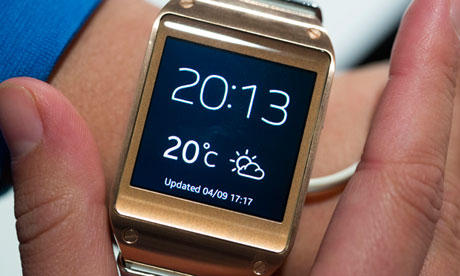
If you've got the time, we've got the technology: Samsung's Galaxy Gear, which was launched in Berlin. Photograph: Gero Breloer/AP
Do you use your wrists much these days? Not for keeping your hands attached but for technology purposes. Do you still wear a watch? Or one of those exercise tracking wristbands? Or one of those crazy-fake-science-victory-crystal wrist things some sportspeople wear? Well, whatever, you'd better get ready, because your wrist is about to become contested techno-media space, like your living room, your pocket or your bag.
You might have missed Samsung's announcement of its Galaxy Gear "smart watch". You won't be able to miss it when Apple launches its iWatch. Soon smart watches will be a market you'll need to have an opinion on. There will be ads everywhere, people ostentatiously flicking their wrists in pubs and John Humphrys not seeing the point on theToday programme. And he won't be alone.
Pundits will point at the long history of failed and foolish smart watches, they'll bang on about battery power and scoff about prices. Maybe they'll be right, but perhaps watches now are like MP3 players before the iPod or portable stereos before the Walkman. We can all sort of see what they might be like, but until they work really well we won't completely understand their possibilities. Now, for instance, smart watches are imagined as tiny smartphones stuck on our wrists, but the genius of the Walkman wasn't just about miniaturisation: it was also about creating a new behaviour – private listening in a public space.
Indeed there's no particular reason why we'll be working these things via screens; we've already got plenty of those and the gadget companies are working hard to find other ways to communicate. We might end up talking to our watches and they'll probably talk back. Perhaps the concert hall of the future won't be ruined by penetrating ringtones but by a thousand tiny speakers muttering the smart watch equivalent of "this vehicle is turning left" or "unexpected item in the bagging area".
Equally, it's possible we won't be using our watches to make calls or manage our contacts. Just as iPhone games fill those gaps when we're commuting, maybe smartwatch games will fill the even smaller gaps while we're waiting by the photocopier. Or we'll use them as better medical alert bracelets, or as combination passwords and keys, or as pedometers. Or someone will work out how to do really tiny porn.
These new possibilities will then obscure the failings we now imagine will be deal-breakers. Androids and iPhones, for instance, have laughably meagre battery life compared to the slightly less smart phones that preceded them, but we barely notice that any more. We adapt, we adopt new practices because the tradeoffs seem worth it. Maybe smart watches will be good enough that we won't mind having to charge them on our bedside tables every night.
Then new behaviours will pop out everywhere. I've had an early attempt at a smart watch – the Pebble – for a while. If I get a message on my phone it also pops out on my watch. I thought this would be good for meetings: you could discreetly check your message without looking as if you were not paying attention. But then, of course, I realised that glancing at my watch was no better; it just looked as if I was bored.
We'll adapt new etiquette for behaviour like this, just as we'll invent amusing new names for the new accidents we'll have crossing the street glued to our wrists.
Most watches have been pointless for years; arguing about utility is ridiculous. Anyone paying more than £8 for a watch is not buying anything better at telling the time. If you want accuracy you should buy a Mr Jones watch; it sells a handsome model that carries on its hands the simple message: Remember, You Will Die. But if you want a visceral feeling for time passing get a smart watch and see how quickly it becomes obsolete
No comments:
Post a Comment
Note: Only a member of this blog may post a comment.